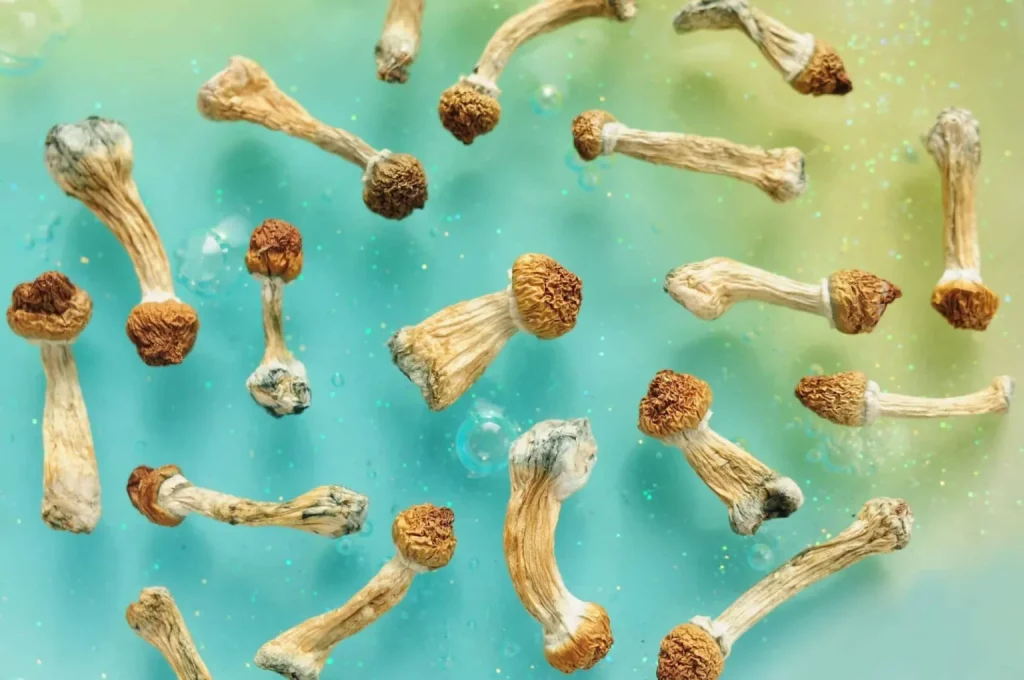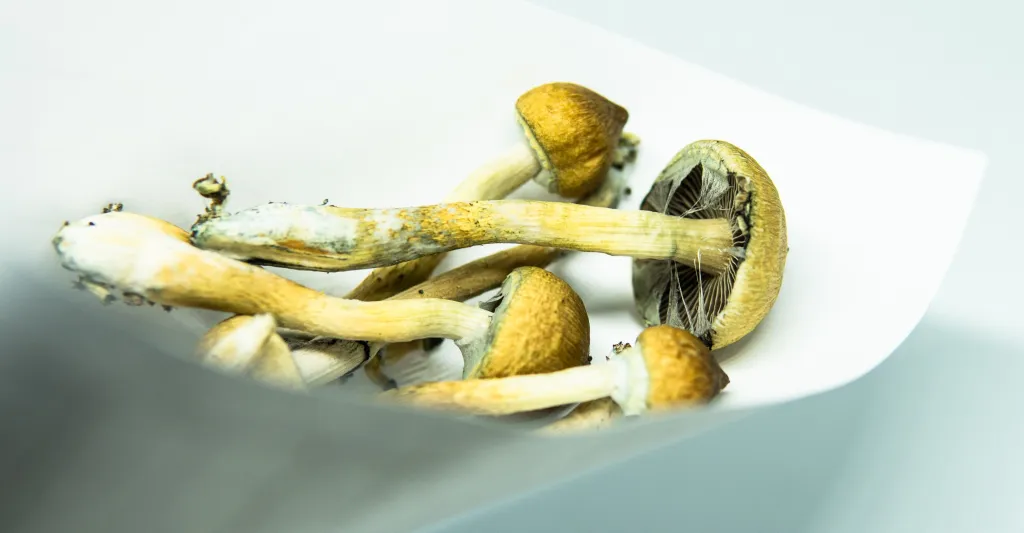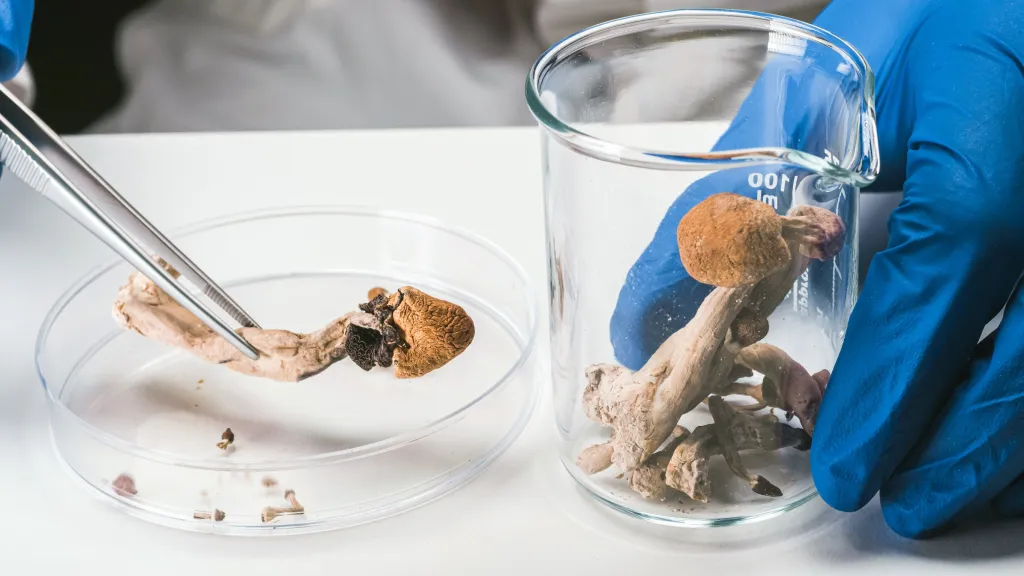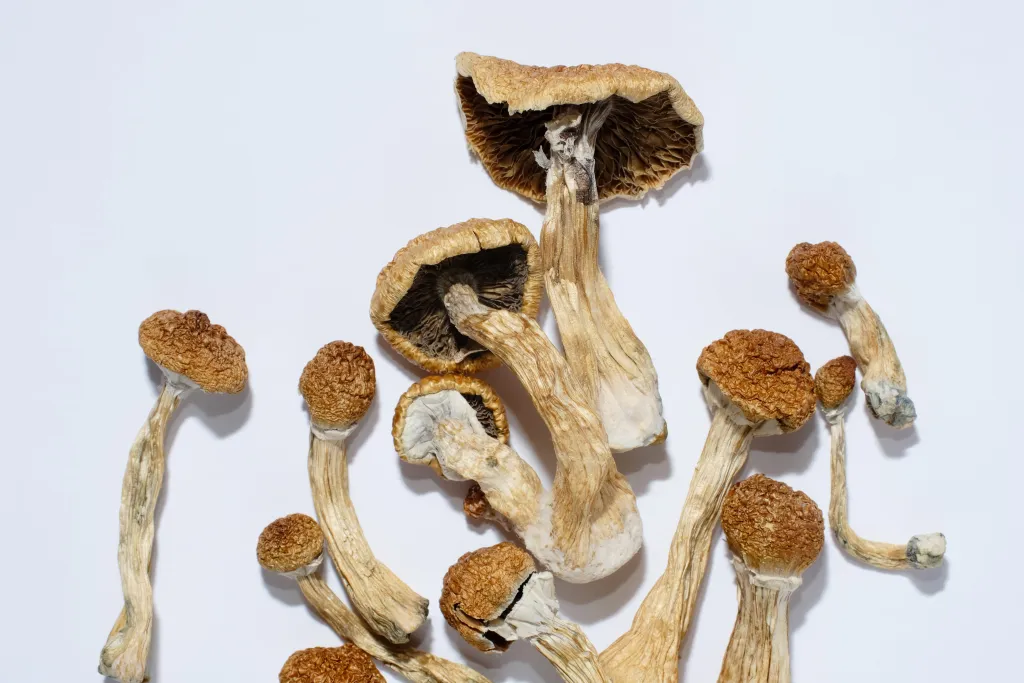Mushroom Effects

With the recent legalization of psilocybin and other drugs in Oregon, we’re also seeing a growing interest in other states. It’s clear that magic mushrooms are here to stay, especially since many enthusiasts swear by their healing properties.
Please remember that the psilocybin mushroom spores sold by Fungushead are for microscopy and taxonomy research purposes only. We encourage people to look up their local laws and regulations before beginning any level of research into these compounds.
It’s believed that psychedelic mushrooms can provide therapeutic relief to those living with anxiety, Post Traumatic Stress Disorder (PTSD), and severe depression. Studies have indicated that mushrooms containing psilocybin show little to no negative side effects when used responsibly making them an intriguing option for those individuals wanting to change from pharmaceuticals.
With more studies underway, scientists and enthusiasts alike hope to shed some light on the healing properties of psilocybin mushrooms.
One of the most popular shrooms (of the psilocybe cubensis variety) in demand today is the Golden Teacher mushroom. This well-known psychedelic mushroom strain contains the active elements psilocybin and psilocin.
The strain is aptly named for its iconic gold-capped appearance as well as its introspective and philosophical effects. The reported effects on the brain and body are unlike other psychedelic varieties, making it a firm favorite amongst many magic mushroom communities.
Golden Teachers have been reported to give a more guided, educative experience, rather than just a pure “trip,” as most experience with other varieties.

Why Psilocybin Is Sought After For Its Effects
Psilocybin is the main ingredient found in several types of psychoactive mushrooms, making it one of the most well-known natural psychedelic drugs. Throughout history, people have been ingesting this common hallucinogenic substance from various mushrooms grown in parts of Europe, South America, Mexico, and the United States.
This common hallucinogen works by activating serotonin receptors, most often in the prefrontal cortex. This particular part of the brain controls mood, cognition, and perception in individuals. It’s also important to note that hallucinogens work in other regions of the brain that regulate arousal and panic responses.
Contrary to popular belief, psilocybin doesn’t always cause active visual or auditory hallucinations. Instead, it distorts how some people perceive objects and people already in their environment.
Studies have revealed that such distortions and experiences may have positive lasting results for patients with various severe psychological disorders. These benefits explain why psilocybin-containing mushrooms are sought after for their effects.
Magical fungi, like the Golden Teacher mushroom, contain psilocybin and psilocin, two naturally occurring psychoactive ingredients. Psilocin is biologically active, whereas psilocybin is a psilocin prodrug. This means that it’s converted into psilocin when ingested via dephosphorylation.
Factors like the amount of ingested mushrooms, personal past experiences, and experience expectations can all impact the effects of psilocybin.
After the gut digests and absorbs these particular magic mushrooms, the body converts them to psilocin. The hallucinogenic effects of psilocin usually occur within 30 minutes of ingesting Golden Teacher mushrooms and can last 4 to 6 hours.
The experienced effects differ based on the factors mentioned above. In some individuals, the changes in sensory perception and thought patterns can last for several days, if not months. A clear understanding of the potential effects is essential to a positive experience when taking Golden Teacher mushrooms or their cousins.
Psilocybin is metabolized mostly in the liver. As it becomes converted to psilocin, it undergoes a first-pass effect, whereby its concentration is greatly reduced before it reaches systemic circulation.
Psilocin is broken down by the enzyme monoamine oxidase to produce several metabolites that can circulate in the blood plasma. Any psilocin not broken down by enzymes then forms a glucuronide—a biochemical mechanism animals use to eliminate toxic substances by linking them with glucuronic acid, which can then be excreted in the urine.
Based on studies using animals, about 50% of ingested psilocybin is absorbed through the stomach and intestine. Within 24 hours, about 65% of the absorbed psilocybin is excreted into the urine, and a further 15–20% is excreted in the bile and feces. It’s important to understand that although most of the remaining drug is eliminated in this way within 8 hours, it’s still detectable in the urine after 7 days.
In comparison to LSD on a weight-per-weight basis, Psilocybin is about 100 times less potent, with the physiological effects lasting almost half as long. Golden Teacher mushroom effects on the brain and body are a complicated and a fascinating look into how nature interacts within itself.

Golden Teacher Mushroom Effects Of The Brain
Generally, the Golden Teacher mushroom’s effects on the brain, or all fungi containing psilocybin, are similar to those of Lysergic Acid Diethylamide (LSD). These mushroom effects include:
- Perception of time, space, and surroundings could be altered
- Sudden and drastic mood or emotion changes
- Paranoia
- Confusion
- Euphoria
- Peacefulness
- Spiritual awakening or enlightenment
- Hallucinations
- Visual alterations and distortions
- Derealization
- Distorted thinking
Psychological distress is a commonly reported negative effect of consuming shrooms. Depending on the individual’s experience, this distress could present itself as extreme anxiety or short-term psychosis.
A crucial factor in the user’s experience when taking Golden Teacher mushrooms, or other shrooms, is the environment. Those who consume psilocybin in a calm and supportive environment often have a more positive transforming experience.
While brain activity generally returns to normal after Golden Teacher Mushroom effects wear off, research suggests some effects could last longer.
A study published in the Journal of Psychopharmacology measured how psilocybin affects five domains of personality—Neuroticism, Extroversion, Openness, Agreeableness, and Conscientiousness. It found “significant increases in Openness” following a high-dose psilocybin session. Openness is a psychological term for an individual’s attitude toward new experiences and can be associated with traits like Imagination, Creativity, and Aesthetic Appreciation. Not only was openness one of the general mushroom effects, but it rose during a psilocybin session. In nearly 60% of study participants, it “remained significantly higher than baseline more than 1 year after the session,” the researchers wrote.
A surprising find since various research has shown that personality doesn’t usually change much after the age of 30. Especially as drastic as found with Golden Teacher Mushroom effects, or with other shrooms.
As we all know from personal experience, in most cases, openness tends to decrease as people get older. Not always, but most often.
Golden Teacher Mushroom Effects Of The Ego
With a basic understanding of how psilocybin interacts internally when ingested, we can dive into the Golden Teacher mushroom effects on the brain. As mentioned, ingesting psilocybin results in it converting to psilocin, which triggers changes in the user’s brain.
Psilocin then binds with serotonin receptors in the brain, specifically the 5-HT2C receptor, which regulates neurotransmitter chemicals. This part of the brain controls appetite, cognition, anxiety, imagination, mood, and perception. It also increases activity in the visual cortex of the brain, leading to changes in perception and visual effects.
It has been shown that psilocin could decrease network activity in the “default mode network,” driving the experience of ego reduction in some people.
Some people have reported losing their sense of self among psilocybin mushroom effects. This lack of ego is typically short-lived but may be related to some longer-lasting mushroom effects of psychedelics.
According to a 2017 study published in the journal Neuroscience of Consciousness, temporary ego loss could prove to be very beneficial in the right context. “This ‘ego dissolution’ results in a moment of expanded awareness, a feeling in which the mind is put more directly and intensely in touch with the world,” said co-author Philip Gerrans, a philosophy professor at the University of Adelaide, in a statement. “Through this experience, it may be possible to re-engineer the mechanisms of self, which in turn could change people’s outlook or worldview. The profound sense of connection produced by this experience has the potential to be beneficial for people suffering from anxiety, depression, and some forms of addiction.” Proving to be substantial hope for many.

Magic And Golden Teacher Mushroom Effects Of The Body
Some of the risks associated with psychedelic shrooms, like Golden Teacher mushrooms, are mostly psychological, not physical.
Physically, magic mushrooms containing psilocybin are considered one of the least toxic drugs known. While lethal doses have been tested and determined in animals, there are no records for fatal doses of psilocybin mushrooms in humans.
Golden Teacher mushroom effects last around 4–6 hours, with peak effects occurring 2–3 hours after ingestion. These effects include:
- Sensory enhancement
- A sense of time changing (minutes can feel like hours)
- Real or imagined objects appear to be moving (flowing patterns and shapes) both with eyes open or closed
Known mushroom effects on the body from psilocybin vary, but more research possibilities have unlocked new knowledge about magic mushrooms.
As with any substance, the body can react differently within each individual. Based on known studies, there are somewhat common side effects on the body from consuming shrooms like, Golden Teacher mushrooms.
Common side effects include:
- Pupil dilation (93%)
- Changes in heart rate (100%)—increases (56%), decreases (13%), variable responses (31%)
- Changes in blood pressure (84%)—hypotension (34%), hypertension (28%), general instability (22%)
- Changes in stretch reflex (86%)—increases (80%), decreases (6%)
- Nausea (44%)
- Tremor (25%)
- Dysmetria (16%) (inability to properly direct or limit motions)
The temporary increases in blood pressure caused by the drug can be a risk factor for users with pre-existing hypertension. These mushroom effects caused by psilocybin have been corroborated by several early clinical studies. A 2005 magazine survey of club goers in the UK found that nausea or vomiting was experienced by over a quarter of those who took psilocybin mushrooms in the last year. Although it’s important to note that this effect is caused by the actual mushroom rather than psilocybin itself.
In one study, administration of gradually increasing doses of psilocybin daily for 21 days had no measurable effect on electrolyte levels, blood sugar levels, or liver toxicity tests. Overall, the mushroom effects on the body in an individual using psilocybin vary between each individual. Personal factors like differences in chemistry, mental state, personality, immediate environment, and personal experience are examples.
If the user experiences issues with mental health or feels anxious about using psilocybin, they face a higher risk of having a bad experience. Hallucinogen Persisting Perception Disorder (HPPD), sometimes mistakenly referred to as “flashbacks,” is a condition unique to psychedelics. During these “flashbacks” users experience perceptual changes lasting weeks or months following the event.
Though exact prevalence is unknown, HPPD is considered relatively rare, with no physical changes or neurological damage associated as the cause. Overall, we, as a human race and society, still have a lot to learn about the Golden Teacher mushroom effects on the brain. Thanks to thousands of years of experience and a growing surge of modern research, we’ve learned enough to know it’s worth learning more.
